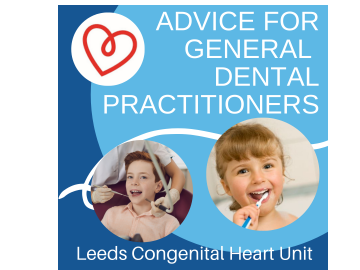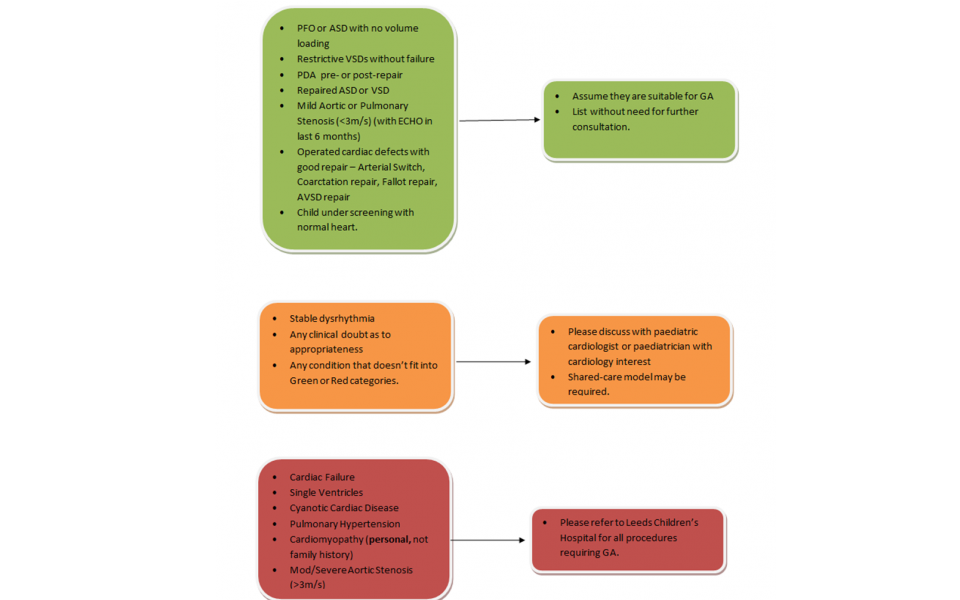Child
- About
- Meet The Team
- Conditions
- Dental Practitioners: Dental care in children at risk of Infective Endocarditis
- Looking after your child’s oral health
- Coming for an echocardiogram
- Outpatient Appointments
- Preparing to Come into Hospital for Surgery
- On Admission to the Children's Ward
- Visiting
- Operation Day
- Children's Intensive Care
- Daily Routine on Intensive Care
- Managing your child's discomfort
- Going Home
- Children's Cardiac MRI Scan
- Cardiac Catheter
- Reveal Device
- Ablation Procedure
- Pacemakers
- INR and Warfarin
- Lifestyle and Exercise Advice
- School Advice
- Attachment
- Yorkshire Regional Genetic Service
- Advice & Support Groups
- Your Views
- Monitoring of Results
- Second Opinion
Dental Practitioners: Dental care in children at risk of Infective Endocarditis
-
Which conditions are at risk?
SDCEP guidelines written in August 2018
Children with the following cardiac conditions are at increased risk of developing infective endocarditis:12
• acquired valvular heart disease with stenosis or regurgitation;
• hypertrophic cardiomyopathy;
• previous infective endocarditis;
• structural congenital heart disease, including surgically corrected or palliated structural conditions, but excluding isolated atrial septal defect, fully repaired ventricular septal defect or fully repaired patent ductus arteriosus, and closure devices that are judged to be endothelialised;
• valve replacement.
-
Advice for general dental practitioners
What is infective endocarditis?
• Endocarditis is a rare infection of the inside of the heart or the main arteries.
• It most commonly affects one or more of the heart valves but may also occur around holes between the heart chambers, at the site of abnormalities in the walls of arteries or at the site of previous heart or arterial surgery.
• It is a serious condition and can cause major damage to the heart valves and may even cause stroke or death.
• Most endocarditis occurs in patients already known to have heart abnormalities.
• Most patients with congenital heart disease are at increased risk of getting endocarditis. The only exceptions being isolated atrial septal defects or patients who have had completely curative treatment.How can I recognise infective endocarditis?
• Patients with endocarditis develop a temperature and feel generally unwell, with symptoms very similar to having the flu.
• Flu is very common and usually resolves after about a week.
• Flu like symptoms with a temperature which persist for longer than a week should be reported to the child’s cardiologist, not just to their GP, so that specialist tests can be carried out to check for endocarditis.When should a child at risk of infective endocarditis have their first dental check- up?
The British Society of Paediatric Dentistry recommends that all children should start to see a dentist as soon as their first teeth come through, and before their first birthday.
Parents of children at risk of infective endocarditis are strongly encouraged by the Cardiology team to seek oral health care with their local general dental practitioner in the first instance.
Children at risk of infective endocarditis should be considered high risk and reviewed on a three monthly basis, as per National Institute for Health and Care Excellence (NICE) recall guidance.
What modes of care can I employ for dental care in children at risk of infective endocarditis?
The safest way for any dental care to be carried out is generally using local anaesthetic. Sometimes sedation, usually inhalation sedation, can also be used to help children and young people to have dental care completed. If dental care cannot be carried out with the child awake then a general anaesthetic will be necessary.
For a small number of patients, treatment under local anaesthetic in a primary care setting is not appropriate e.g. long QT syndrome, and advice from the patient’s cardiologist should be sought in the first instance .
Should antibiotic prophylaxis be given prior to dental care in children at risk of infective endocarditis?
NICE guidance on antimicrobial prophylaxis against infective endocarditis in adults and children undergoing interventional procedures was updated in 2016. This guidance advised that antibiotic prophylaxis is not routinely recommended for individuals at risk of infective endocarditis who are undergoing dental procedures.
The Scottish Dental Effectiveness Programme (SDCEP) has produced a supporting document around the implementation of the NICE guidance (http://www.sdcep.org.uk/published-guidance/antibiotic-prophylaxis/).
The Consultants at Leeds Children’s Hospital have reviewed both the NICE and SDCEP guidance documents above and have advised that they do NOT recommend antibiotic prophylaxis for any patients under their care.
It is nonetheless necessary for the dentist providing oral health care to discuss antibiotic prophylaxis with the patient/ carer and their agreement, or otherwise, regarding this; these discussions should be clearly recorded in the patient’s record.
A leaflet for patients to support this discussion can be found here linkMy patient has a pacemaker, is there any dental care that I should avoid?
There is a low risk, if following safety precautions, of use of apex locators and ultrasonic scalers in patients with pacemakers. Electrocautery equipment should be avoided.
Where there are any doubts about the use of such dental equipment in a patient with a pacemaker, the manufacturer of the dental equipment should be contacted for further guidance in the first instance.
What if my patient requires dental care under general anaesthetic?
Any patients who require a general anaesthetic for their dental care should initially be referred by their family dentist to the local specialist/ consultant led paediatric dentistry service. Here is a list of the local specialist/ consultant led paediatric dentistry services in Yorkshire and Humber that such children can be referred to:
Geographical area Specialist/Consultant led paediatric service
Barnsley, Doncaster and Rotherham: Community Dental service, The Rotherham NHS Foundation Trust
Bradford and Airedale Community Dental Service, Bradford District Care NHS Foundation Trust
Halifax, Huddersfield, Batley, Dewsbury, Cleckheaton Community Dental Service, Locala Dental Care
Hull Community Dental Service , City Health Care Partnership CIC
Leeds Community Dental Service, Leeds NHS Community Healthcare Trust Or Leeds Dental Institute, Leeds Teaching Hospitals Trust
Sheffield Community And Special Care Dentistry OR Charles Clifford Dental Hospital, Sheffield Teaching Hospitals NHS Foundation Trust
Wakefield, Castleford, Pontefract Mid Yorkshire Hospitals NHS Trust
York, Harrogate and North Yorkshire Community Dental Service, Harrogate and District NHS Foundation Trust.
Advice for dental practitioners providing dental care under general anaesthetic
For patients who require dental care under general anaesthetic, patients with simple cardiac lesions can have their treatment performed in the local District General Hospital- please see flow chart below for more detailed information.
If the patient has a more complicated cardiac condition, the advice as to whether the patient can be treated locally or at the specialist centre will have to be given on an individual basis based on the patient’s up to date medical condition- please see flow chart below for more detailed information.
If you require advice about elective dental treatment then please contact Dr J Scheffczik, Paediatric Cardiac Anaesthetist based at Leeds General Infirmary for advice:
Dr J Scheffczik email: j.scheffczik@nhs.netIf the patient requires urgent dental treatment with general anaesthetic please contact the paediatric cardiac anaesthetist on call or the paediatric cardiologist on call via the hospital switchboard at Leeds General Infirmary. Tel 0113 2432799
-

